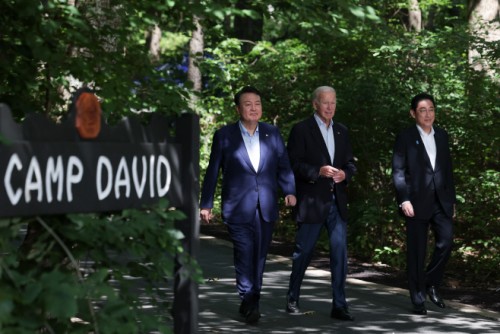 |
| President Yoon Suk Yeol, U.S. President Joe Biden and Japanese Prime Minister Fumio Kishida arrive at the venue for their joint press conference after their trilateral summit at Camp David in Maryland on Aug. 18, 2023./ Source: Presidential Office |
AsiaToday reporter Hong Sun-mi
The trilateral cooperation system among South Korea, the U.S., and Japan will certainly reduce the risk and increase the opportunity for our people,” President Yoon Suk-yeol said Monday.
The president emphasized that the security and economic consultative body of the three countries, which was created in the wake of the Camp David Summit, will provide practical benefits to the people and change their live beyond the launch of a new international order.
He made the remark during a Cabinet meeting at the presidential office, which was held to discuss the Ulchi civil defense exercise that kicked off the same day. “The unprecedented global complex crisis involving various challenges is calling for a new level of response paradigm,” Yoon said.
“The bigger the threat from the North grows, the stronger the structure of trilateral security cooperation among the three countries will become,” Yoon said in a green civil defense suit, emphasizing strengthening cooperation against the North, including missile warning information sharing system, military defense exercises, and surveillance of cyber illegal activities.
“From now on, cooperation mechanisms among South Korea, the U.S., and Japan will function as powerful cooperation mechanisms promoting peace and prosperity in and outside the region, together with AUKUS and Quad, and continue to expand and develop,” he said, referring to the trilateral security pact involving Australia, Britain, and the U.S., and the Quadrilateral Security Dialogue involving the U.S., Australia, Japan, and India.
Yoon picked “supply chain solidarity” as the benefits and practical advantage of trilateral cooperation for South Korea.
“Once the three countries connect the supply chain early warning systems they have been operating individually until now, our supply chain information and resilience level will improve dramatically,” he said.
He further noted that the trilateral partnership allows prompt responses from external disruptions, citing a nationwide shortage of diesel exhaust fluid that caused public inconvenience, as well as addressing uncertainties of industries with high dependency on critical minerals, such as semiconductors, electric vehicles, and rechargeable batteries.
Referring to high-tech security cooperation among the three countries and trilateral cooperation to stabilize the financial and foreign exchange markets, he said, “In the end, the size and resilience of the market that our companies and our people can enter will expand.”
#Yoon Suk-yeol #Camp David Summit
Copyright by Asiatoday
Most Read
-
1
-
2
-
3
-
4
-
5
-
6
-
7





















